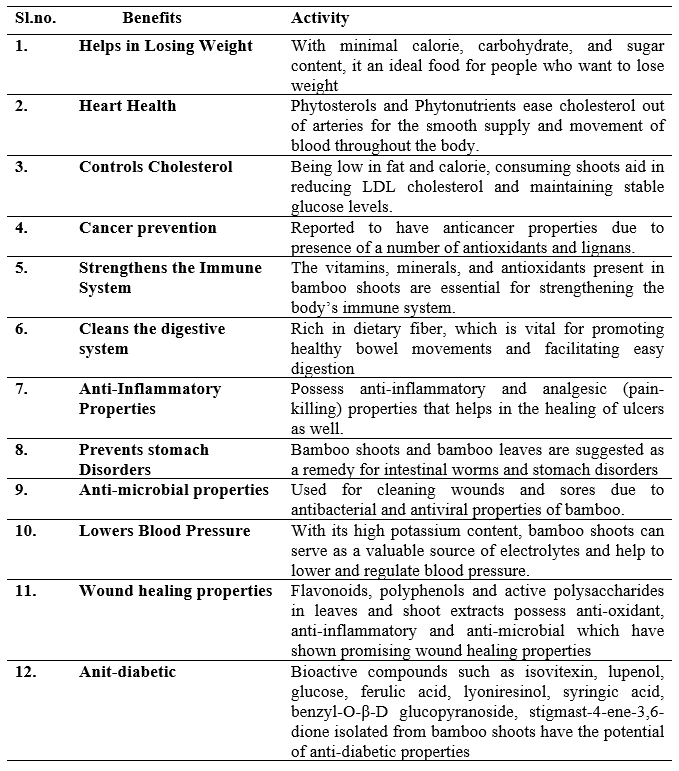Health Benefits and Nutritional Value of Bamboo Shoot
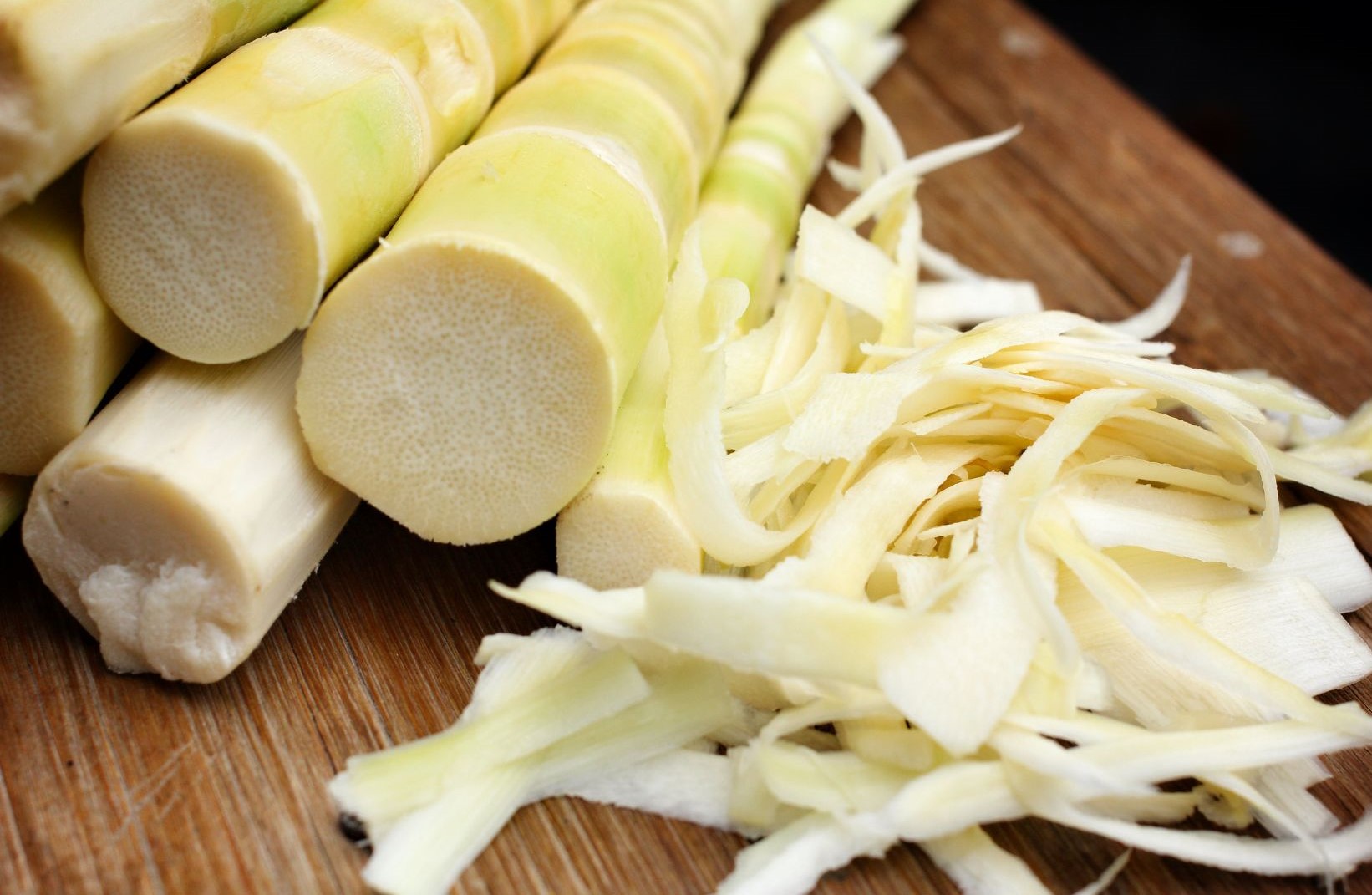
This post is also available in:
This post is also available in:
![]() Español (Spanish)
Español (Spanish) ![]() Français (French)
Français (French)
In the 21st century, bamboo shoot is recognized as a superfood and is used to prepare many food and pharmaceutical products. The utilization of bamboo shoots as food is mainly concentrated in Southeast Asian countries, and it still remains unexploited in other parts of the world (Santosh et al., 2023). Sustainable development, food safety control, and the clarification of their potential health effects are suggested for future consideration (Wang et al., 2020). The juvenile bamboo shoots are delicious as well as rich in nutrient components, mainly proteins, carbohydrates, minerals, vitamins, and dietary fiber, which exhibit great potential as a food resource. 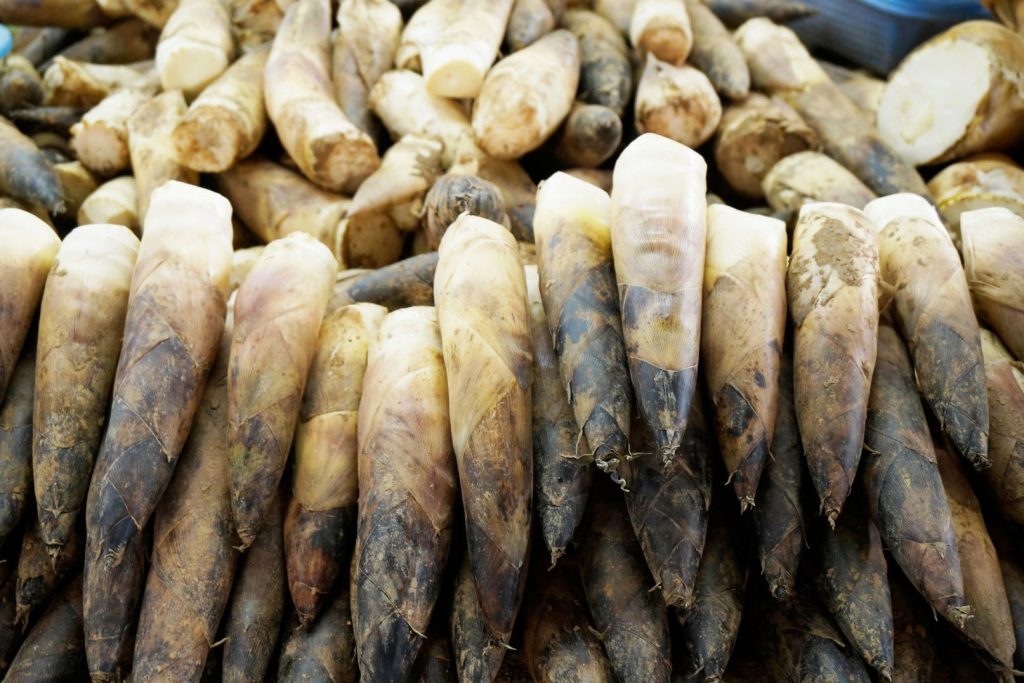
Nutritional Value of raw Bamboo shoots
Based on USDA, 100g of raw Bamboo shoots contain:
- Energy: 27 kcal
- Water: 91 g
- Protein: 2.6 g
- Total dietary Fiber: 2.2 g
- Sugars: 3 g
- Potassium: 408-5980 mg (highly depends on the bamboo species)
- Phosphorus 59 mg
- Calcium: 13 mg
- Vitamin C: 4 mg
Health Benefits of Bamboo Shoots Consumption
It has a high amount of antioxidants, and polyphenols, is low in fat, and is a good source of health-promoting bioactive compounds such as phytosterols, flavonoids, and phenolic acids. The nutritional and bioactive constituents of bamboo shoots are associated with several health benefits that include decreasing blood pressure, and cholesterol, increasing appetite, having anti-cancerous and anti-diabetic properties, reducing the risk of cardiovascular diseases, hypertension, obesity, cancer, and certain gastrointestinal disorders, lowers the level of sugar in the blood, promotes regularity, prevents constipation, antihyperglycemic, immunomodulatory, antiinflammatory, antimicrobial, cardioprotective, and neuroprotective abilities (Chongtham & Bisht, 2020).
Bamboo is known for its therapeutic significance and is an integral part of the traditional medicinal system worldwide, including Ayurveda, Chinese, Indo-Persian, Unani, and Tibetan practises. Almost every part of bamboo, such as rhizomes, roots, culm, culm sheaths, seeds, leaves, sap, and shoots, are used for medicinal purposes for treating injuries, fever, skin infections, bleeding gums joint pains, and many more. Bamboo has been incorporated into many traditional formulas to treat lung, stomach, bone, and skin-related problems, wounds, and poisonous bites. Medical applications of Tabasheer were documented in Indian Ayurveda over 10,000 years ago as a fundamental constituent of Chyawanprash, a health tonic to bestow youth, beauty, and life (Nirmala et al., 2018). The medicinal properties of bamboo shoots were also documented in the book Compendium of Materia Medica of the Ming Dynasty (1368–1644), which mentioned the benefits of a liquid circulatory system (Yuming & Jiru, 1999). Extracts of leaves and shoots show potential antimicrobial, antiinflammatory, and wound-healing properties (Kalyan et al., 2023). The potential of bamboo shoots is gaining popularity in the food, nutraceutical, cosmeceutical, and pharmaceutical sectors due to their many health-promoting properties.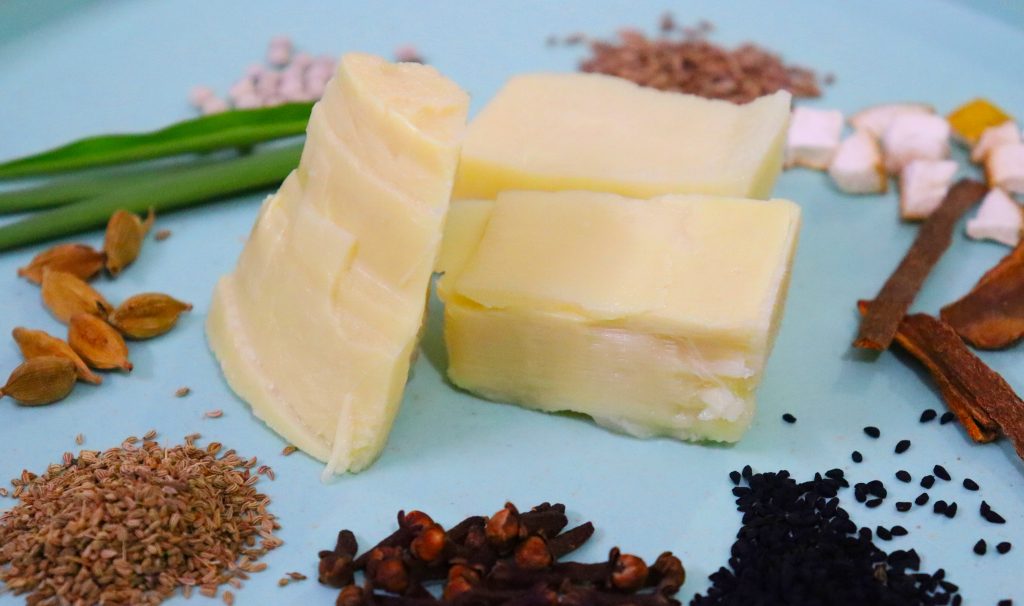
Health Beneficial Properties of Bamboo Shoots
Bioactive Compounds in Bamboo Shoots
Bioactive compounds, found in small amounts in food, can enhance the human body’s metabolic processes and provide health benefits by influencing activities such as antioxidant function, enzyme function, receptor function, and even gene expression. Bamboo shoots are a rich source of bioactive compounds with a combination of different dietary fiber components. In the pharmaceutical and nutraceutical industry, bamboo shoots can be a good source of phytosterol which is used for making steroids. Phytosterols serve as a precursor to several pharmaceutical steroids, and phenols function as free radical terminators, metal chelators, and singlet oxygen quenchers. Several phytosterol compounds have been identified in bamboo shoots, including 6-keto cholestanol, desmosterol, ergosterol, cholesterol, lanosterol, cholestanol, stigmasterol, campesterol, β-sitosterol, and stigmastanol (Chongtham & Bisht, 2020).
There are several health-promoting properties of phenol such as antioxidant and antimicrobial activity, due to which bamboo shoots are gaining importance in the food industry. The isolation of compounds such as isovitexin, lupenol, glucose, ferulic acid, lyoniresinol, syringic acid, benzyl-O-β-D glucopyranoside, stigmast-4-ene-3,6- dione from bamboo species Bambusa textilis, Phyllostachys edulis, P. nigra, P. prominens, P. pubescens, Sasa coreana, S. veitchii (Indira et al., 2023). Park and John (2010) identified eight phenolic compounds from the shoot extracts of P. pubescens and P. nigra, which include protocatechuic acid, p-hydroxybenzoic acid, catechin, caffeic acid, chlorogenic acid, syringic acid, p-coumaric acid, and ferulic acid.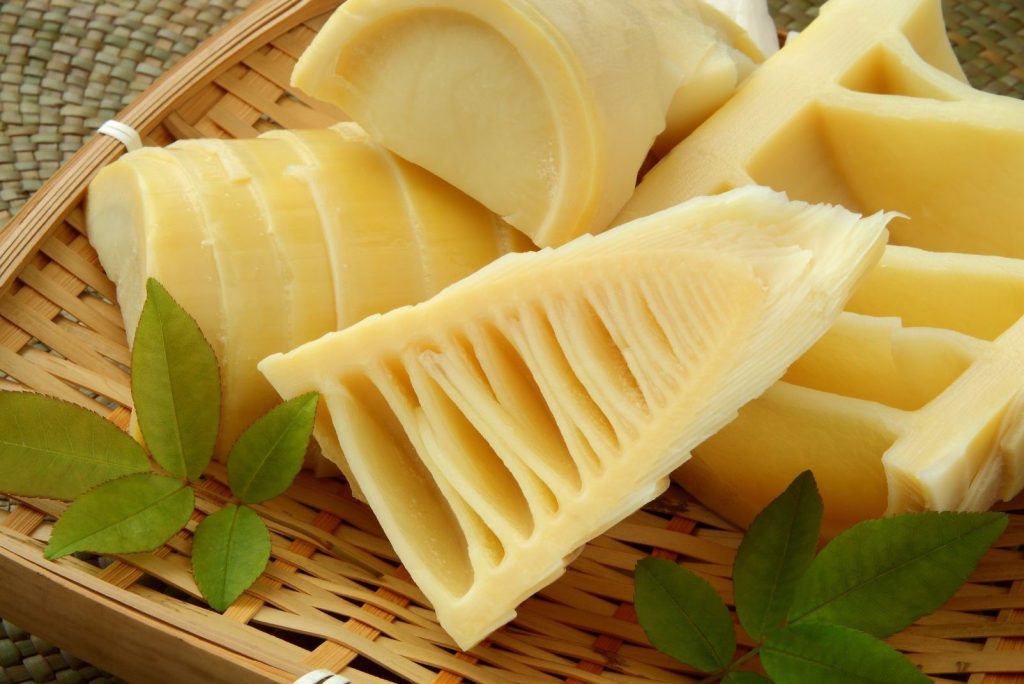
Dietary Fiber in Bamboo Shoots
Dietary fiber is a unique blend of bioactive components composed of indigestible plant parts and carbohydrate molecules that can bind and eliminate harmful toxins and carcinogens in the digestive tract. Bamboo shoots are a rich dietary fiber source with several health benefits, including treatment and prevention of obesity and diabetes, reduced cardiovascular diseases, and decreased incidence of certain types of cancer (Nirmala et al., 2009). The health benefits of dietary fiber from bamboo shoots were explored in a study by Park and Jhon (2009), which involved the comparison of a fiber-free diet with one containing bamboo shoot fiber and demonstrated the positive effects of bamboo shoot dietary fiber on improving bowel functions and reducing blood cholesterol levels. Bamboo shoots contain lignans, a significant fiber component known for its reported properties of anticancer, antibacterial, and antiviral activity (Santosh et al., 2023). Incorporating bamboo shoots into a daily diet can provide a wide range of health benefits, including improved digestive health, lower cholesterol levels, and reduced risk of chronic diseases.
Minerals in Bamboo Shoots
Minerals are the major groups of micronutrients essential for normal body growth, a vital role in maintaining the structural and physiological growth, and hormonal and regulatory functions of the body in building muscles and bones. Bamboo shoots are reported to have a good profile of minerals, including potassium, calcium, manganese, zinc, chromium, copper, iron, phosphorus, manganese, nickel, and selenium. Fresh bamboo shoots have a high content of potassium, reported up to 5980 mg/100g dry weight in B. bambos. Potassium is a crucial electrolyte that is essential for regulating blood pressure, maintaining fluid balance, and supporting proper muscle and nerve function (Chongtham et al., 2021). Magnesium is another mineral found in abundance in bamboo shoots. This mineral plays a critical role in maintaining healthy bones, supporting proper nerve and muscle function, and regulating heart rhythm. It is also essential for maintaining healthy blood sugar levels, which is crucial for individuals with diabetes or those at risk. Calcium, another vital mineral found in bamboo shoots, is essential for maintaining strong and healthy bones and also plays a crucial role in muscle and nerve function, blood clotting, and hormone secretion. Manganese, phosphorus, and zinc are other essential minerals found in bamboo shoots. The mineral content of bamboo shoots has numerous health benefits. Regular consumption of bamboo shoots can help regulate blood pressure, support healthy bones, aid in wound healing, and promote healthy digestion. 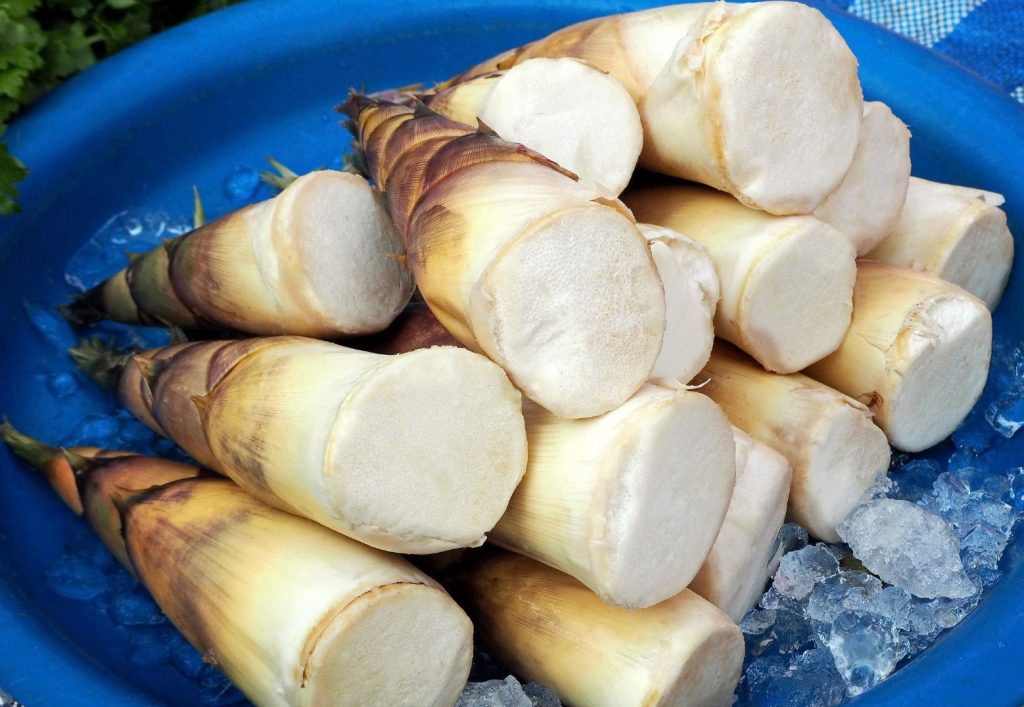
Antioxidant Activities of Bamboo Shoot
Antioxidants are substances or compounds which inhibit the oxidation of other molecules in our body and prevent the formation of free radicals by scavenging them.
It plays a significant role in promoting cardiovascular health, preventing diabetes, inhibiting cancerous tumor growth, slowing down the aging process in the brain and nervous system, and reducing the risk and severity of neurodegenerative diseases such as Alzheimer’s and Parkinson’s disease (Mbah et al., 2019). Numerous natural compounds with antioxidant properties can be extracted from plants, such as phenols, polyphenols, vitamin C, vitamin E, beta-carotene, flavonoids, amino acids, and amines. These compounds have been identified to possess the potential to minimize the risk of chronic diseases. The main antioxidants in bamboo shoots are phenols, vitamins C and E, and mineral elements such as selenium, copper, zinc, iron, and manganese (Nirmala et al., 2018). Several identified antioxidants derived from bamboo shoots display certain biological roles, including anti-oxidative, anticancer, anti-hypertensive, and antibacterial. Bamboo, a fast-growing plant with abundant biomass, can provide an alternative source for producing natural antioxidants, which are currently in high demand due to the potential health hazards associated with synthetic antioxidants used in food and pharmaceuticals.
References
Chongtham, N., & Bisht, M.S. (2020). Bamboo shoot: superfood for nutrition, health and medicine. CRC Press.
Chongtham, N., Bisht, M. S., Bajwa, H. K., Santosh, O., & Indira, A. (2021). Mineral elements in Bamboo shoots and Potential role in Food Fortification. Journal of Food Composition and Analysis, 103662.
Indira A., Joshi B., Santosh O., Koul A., & Nirmala, C. (2023). Potential of Bamboo in the Prevention of Diabetes-Related Disorders: Possible Mechanisms for Prevention in Bamboo Science and Technology, Palombini F L, Nogueira F M (Eds.), Springer Singapore 2023, ISBN 978-981-99-0015-2.
Kalyan N., Santosh O., Indira A., Kuhad A., & Nirmala, C. (2023). Therapeutic Aspects of Bamboo for Wound Healing in Bamboo Science and Technology, Palombini F L, Nogueira F M (Eds.), Springer Singapore 2023, ISBN 978-981-99-0015-2.
Mbah, C.J., & Onah, C.M. (2019). Physicochemical Properties and Bioanalytical Methods of Therapeutic Agents Utilized in the Management of Alzheimer’s Disease. Acta Scientific Pharmaceutical Sciences, 3, pp.35-41.
Nirmala C., Bisht M. S., Bajwa H.K., & Santosh O. (2018). Bamboo: A rich source of antioxidants and its application in the Food and Pharmaceutical industry. Trends in Food Science and Technology, 77: 91-99.
Nirmala, C., Sheena, H. and David, E. 2009. Bamboo shoots: a rich source of dietary fibres. in Dietary fibres, fruit and vegetable consumption and health (ed. Klein, F. and Moller, G.), Nova Science Publisher, Inc., New York, pp. 173-187.
Park EJ, Jhon DY (2009) Effects of Bamboo Shoot Consumption on Lipid Profiles and Bowel Function in Healthy Young Women. Nutrition, 25:723-728
Park, E.J. and Jhon, D.Y. 2010. The Antioxidant, Angiotensin Converting Enzyme Inhibition Activity, and Phenolic Compounds of Bamboo Shoot Extracts. LWT-Food Science and Technology, 43(4): 655-659.
Santosh O., Bajwa, H. K., Indira A., Bano S., Dolma N., Bisht, M. S., & Nirmala, C. (2023). Novel Food Product Development Through Food-to-Food Fortification with Nutrient and Bioactive Compound-Rich Bamboo Shoot in Bamboo Science and Technology, Palombini F L, Nogueira F M (Eds.), Springer Singapore 2023, ISBN 978-981-99-0015-2.
Wang, Y., Chen, J., Wang, D., Ye, F., He, Y., Hu, Z., & Zhao, G., (2020). A systematic review on the composition, storage, processing of bamboo shoots: Focusing the nutritional and functional benefits. Journal of Functional Foods, 71, p.104015.
Yuming, Y., & Jiru, X. (1999). Bamboo Resources and Their Utilization in China. In: Rao, A.N., Ramanatha Rao V, (Eds). Proceedings of Training Course cum Workshop; 1998 May 10-17.



















